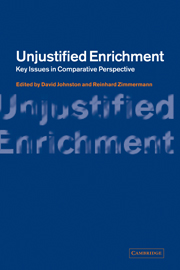Book contents
- Frontmatter
- Contents
- List of contributors
- Preface
- Table of cases
- List of abbreviations
- I Introduction
- II Enrichment ‘without legal ground’ or unjust factor approach
- III Failure of consideration
- IV Duress and fraud
- V Change of position
- VI Illegality
- VII Encroachment and restitution for wrongs
- VIII Improvements
- IX Discharge of another person's debt
- X Third-party enrichment
- 18 ‘At the expense of the claimant’: direct and indirect enrichment in English law
- 19 Searches for silver bullets: enrichment in three-party situations
- XI Proprietary issues
- XII Taxonomy
- Index
19 - Searches for silver bullets: enrichment in three-party situations
Published online by Cambridge University Press: 31 July 2009
- Frontmatter
- Contents
- List of contributors
- Preface
- Table of cases
- List of abbreviations
- I Introduction
- II Enrichment ‘without legal ground’ or unjust factor approach
- III Failure of consideration
- IV Duress and fraud
- V Change of position
- VI Illegality
- VII Encroachment and restitution for wrongs
- VIII Improvements
- IX Discharge of another person's debt
- X Third-party enrichment
- 18 ‘At the expense of the claimant’: direct and indirect enrichment in English law
- 19 Searches for silver bullets: enrichment in three-party situations
- XI Proprietary issues
- XII Taxonomy
- Index
Summary
Introduction
The approach to ‘indirect’ or ‘three-party’ enrichment situations differs greatly from country to country. There is no clear fault-line between civilian and common-law systems, but generally speaking it seems to have emerged more patently as a problem in civilian systems. At the one end of the spectrum is Germany, where Peter Schlechtriem has called them the ‘nightmare of the law of enrichment’, while Reinhard Zimmermann and Jacques du Plessis noted that they constitute ‘an almost impenetrable jungle of dispute and uncertainty’. At the other end is England, where Peter Birks's remark that it is hard even ‘to discover the English equivalent to the “triangular relationship” and “indirect enrichment”’, illustrates how utterly differently legal systems are able to view the same fact situations. Between these extremities there are a number of legal systems where the problems associated with these situations are recognised, but where the solutions are far too simplistic or, at best, not fully developed. Among these we may count, aptly, the mixed jurisdictions of South Africa and Scotland (but perhaps also France and the various jurisdictions of the United States). Why these situations should cause so much dogmatic distress in one system, while seeming to be of such little import in another, is not immediately obvious, but there are certain clues.
First, the general understanding of three-party situations has suffered, depending on which legal system one is concerned with, from either underanalysis or overanalysis.
- Type
- Chapter
- Information
- Unjustified EnrichmentKey Issues in Comparative Perspective, pp. 526 - 568Publisher: Cambridge University PressPrint publication year: 2002
- 2
- Cited by

